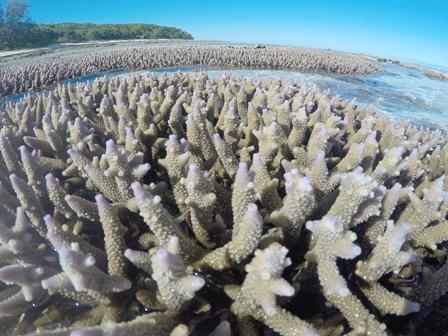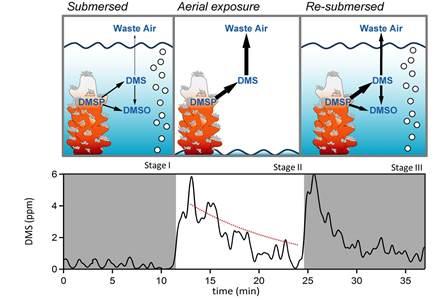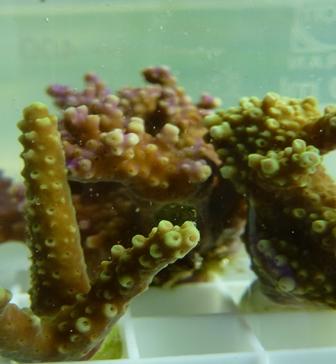Corals are inherently connected to atmospheric climates, and are especially influenced by climate change – increased anthropogenic CO2 is making our reefs warmer and more acidic, but in parallel driving more extreme El Nino events that induce mass coral bleaching. Now, new research led by the University of Plymouth (PML) UK in collaboration with University of Technology Sydney and University of Essex demonstrates that corals also play key roles in contributing to processes that influence their immediate climate.

The scientists showed that tropical reef building corals exposed at low tide emit unprecedented amounts of the important climate gas dimethylsulfide (DMS) directly to the atmosphere. DMS provides a key step in cloud formation and may offer a means to locally reduce transient light and heat stress to reefs. They conclude that this source, which has so far been overlooked by climate models, may be critically important to regulation of the tropical atmosphere.
Past research has shown corals can produce vast amounts of DMS that continually seeps into the surrounding water but is broken down before it reaches the sea surface. However, DMS concentrations in the atmosphere above coral reefs rise when the corals are exposed at low tide. Therefore the team conducted novel experiments to examine DMS as emissions as corals were simulated to low tide conditions.

(Stage I), during air exposure (Stage II) and when re-submersed (Stage III). Upper panel shows experimental approach with arrow sizes indicating relative strength of production pathways. Lower panel shows high frequency measurements (black line) of DMSgas in the outflow of a flask containing the coral Acropora cf. horrida before, during and after air exposure. The red dashed line shows the calculated loss rate due to flushing of the flask.
" alt="Conceptual diagram of dimethylated sulfur cycling in the presence of coral " title="Conceptual diagram of dimethylated sulfur cycling in the presence of coral ">Lead Investigator Dr Frances Hopkins from PML explains: “Our experiments suggest that DMS emissions from coral reefs may be in the same order of magnitude as other marine DMS hotspots, such as transient phytoplankton blooms. This large input of DMS from coral reefs is currently unrecognised in climate models so we now need in situ measurements of DMS above reefs to really get a handle on how much they may contribute to global DMS fluxes”
UTS Team Leader of the Climate Change Cluster (C3) Future Reefs Program Associate Professor David Suggett collaborated on the experiments to examine how this elevated DMS potentially reflected changes in the corals’ health. He adds “Our physiological data showed that corals were not stressed during exposure to air whilst emitting DMS; our combined observations are consistent with how corals use sulphur compounds that are precursors to DMS to accelerate their stress tolerance pathways”.

The novel findings of this team are highly relevant to the Great Barrier Reef. With an estimated 30% of all corals killed in the northern Great Barrier Reef alone this year, loss of potential for corals to further regulate local climates leaves the remaining corals more exposed than ever to further stressors. A/Prof Suggett adds “This work provides yet more evidence that the future of coral reefs are inextricably linked to the health of our climate. As climate change destroys our reefs, the capacity for corals to contribute to Earth’s natural climate regulation capacity will further diminish.”
Recognising the limitations of the laboratory based experiments Dr Hopkins sees next steps as in situ measurements in reef environments to better quantify the importance of DMS in tropical marine atmospheric chemistry.
Publication details
‘Air exposure of coral is significant source of dimethylsulfide (DMS) to the atmosphere.’ Frances E. Hopkins, Thomas G. Bell, Mingxi Yang, David J, Suggett & Michael Steinke, (2016) is published today in Nature Scientific Reports: Sci Rep. 6, 36031. DOI: 10.1038/srep36031.
A copy of the paper can be downloaded at http://www.nature.com/articles/srep36031

